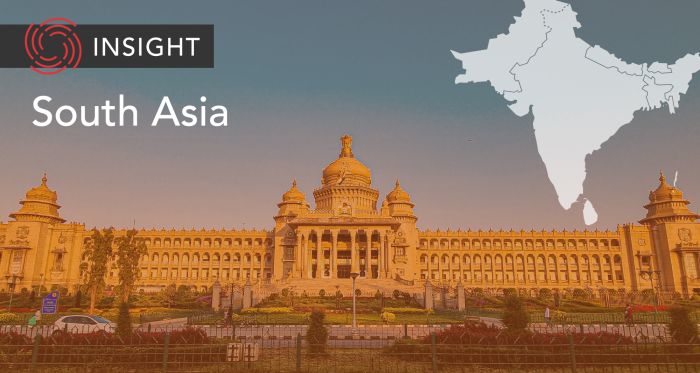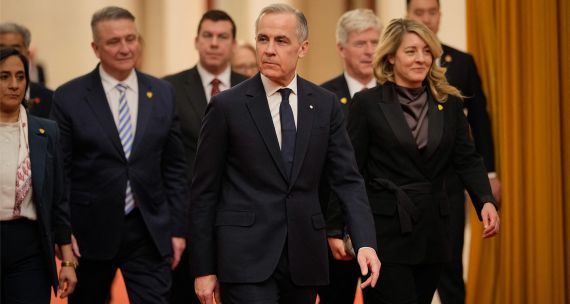The Takeaway
Indian Prime Minister Narendra Modi’s recent state visits to the U.S. and Egypt indicate a growing shift in global politics as India solidifies its alliances. The U.S. is seeking to cultivate its alliance with India to counter China's expanding dominance in the Asia Pacific. Egypt, meanwhile, hopes that Modi's late-June visit could boost Egypt’s bid to join the five-member BRICS economic bloc, and strengthen its trade and defence sector. Following the two visits, all eyes are on India: its renewed realignment with partners could signal an inflection point in global politics — or a turn into a strategic cul-de-sac.
In Brief
On June 23, Modi concluded his three-day U.S. state visit, which was closely followed by a two-day visit to Egypt. In the U.S., Modi met with his counterpart, President Joe Biden, attended a state dinner, addressed a joint session of the U.S. Congress, and discussed collaborations with top tech giants around defence and technology, artificial intelligence, and semiconductor production. The Egypt visit — the first by an Indian prime minister since 1997 — marked yet another significant event as India strengthened its partnership with Egypt on trade, cybersecurity, information technology, and culture. The positive outcomes from both visits signal India’s growing influence as a foreign investment market as well as its political clout.
Implications
Both visits highlighted India’s prioritization of the crucial defence and technology sectors and India’s goal of becoming a strategic partner to both states. According to defence experts, India’s fast-paced industrial expansion, the driving force behind the Modi-Biden tech-defence collaboration, will be critical to maintaining peace in the Asia Pacific. Modi’s U.S. visit led to several crucial agreements, including the inking of a combat jet deal between U.S.-based General Electric and Hindustan Aeronautics, an Indian public-sector aerospace company. The deal will help to lower India’s dependence on Russian arms imports and generate employment opportunities with cost-effective domestic production. India is also exploring purchasing 30 uncrewed long-endurance MQ-9 Reaper drones from General Atomics Aeronautical Systems, which could strengthen India’s border security.
Meanwhile, Modi’s two-day visit to Egypt carried substantial regional and global significance, following President Abdel Fattah el-Sisi’s visit to Delhi earlier in 2023. The India-Egypt partnership not only offers New Delhi an opportunity to enhance its presence in North Africa but also strengthens Egypt’s position in global supply chains. Moreover, it provides a platform for India to showcase its defence capabilities and support Egypt in developing its own defence sector. India also understands the immense importance of the Suez Canal for its trade, connectivity, and maritime security.
Aside from defence, Modi’s U.S. visit also helped secure significant tech deals. Modi met with Elon Musk. The tech mogul expressed his intention to establish Starlink internet services in India, with the aim of connecting rural towns that currently lack affordable connectivity, which could be significant for the roughly 700 million Indians who still lack internet access. The meeting also resulted in discussions about Tesla’s new plant location in India, solar energy investments, and Musk’s potential visit to India in 2024.
Modi’s U.S. visit also helped to kickstart India’s semiconductor industry, as various U.S.-based multinational companies unveiled their investment plans while Modi was there. The sector is a priority for the Indian government and is expected to see a government allocation of C$12.2 billion (760 billion Indian rupees) in semiconductor incentives and assistance to attract applications from foreign companies to set up manufacturing units.
What’s Next
-
India’s renewed focus on non-alignment in global politics
India and Egypt have a long-standing relationship that dates to the 1950s. At that time, they played significant roles in establishing the Non-Aligned Movement, which sought a neutral path between the West and the Soviet Union. As for the U.S., India has been careful in creating more alliances due to the U.S.’s close ties with Pakistan. However, with China’s emergence as a rival power, India has found a secure footing in the U.S. Indo-Pacific Strategy.
-
Modi’s complicated relationship with the Indian diaspora
Modi’s White House visit garnered considerable criticism from the Indian diaspora in the U.S. More than 70 members of the U.S. Congress endorsed a letter urging Biden to recognize the deteriorating state of human rights and democratic values in India under Modi's leadership, while others have spoken out about the effects of Modi's brand of Hindu nationalism on Indians and the diaspora. As a record-number of U.S. Congress members identify as people of Indian descent, it is worth watching how India’s strategic dissonance with the U.S. on some broader issues, including on Russia, plays out going forward as the diaspora presence within the U.S. government grows stronger.
-
2024 Indian general elections
Public opinion polls suggest a sweeping victory for Modi’s Bharatiya Janata Party in the general elections in 2024. Modi’s diplomatic visits, the promising tech development deals, and bilateral trade and investment talks are likely to spur India’s growth trajectory. These developments may strengthen Modi’s already popular image, bolstering his chances for a third term.
• Produced by CAST's South Asia team: Dr. Sreyoshi Dey (Senior Program Manager); Prerana Das (Analyst); Suyesha Dutta (Analyst); and Deeplina Banerjee (Analyst).




